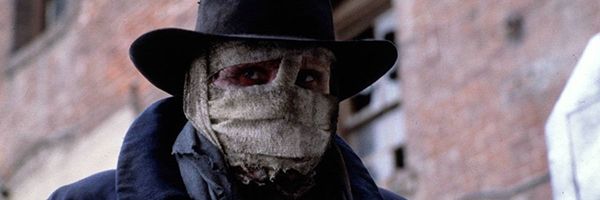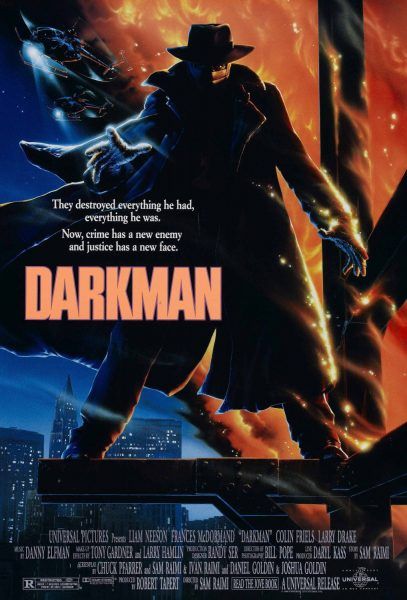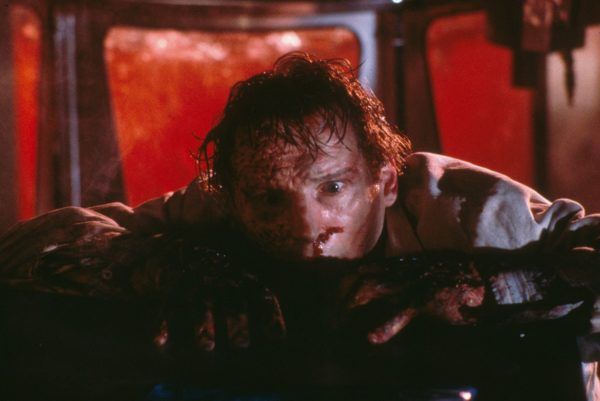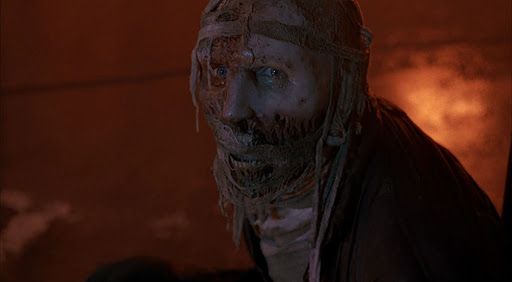A superhero movie that kind of gets lost in the shuffle when discussing the hugely popular genre is the 1990 film Darkman. It’s somewhat understandable – the film wasn’t an enormous hit, and it wasn’t based on any existing comic book characters or storylines. Indeed, Darkman was born out of Evil Dead filmmaker Sam Raimi’s desire to adapt The Shadow, only to learn the rights were already held by someone else (it was eventually made and released in 1994). Raimi decided he’d create his own shadowy superhero and struck a deal with Universal Pictures to tackle his first big studio movie. What ensued was a long, difficult process beset by poor test screenings and Universal’s lack of confidence, but a new oral history reveals that the cut that was eventually released was secretly put together at the last minute without the studio’s blessing.
Hugely influenced by the Universal monster movies, Darkman stars Liam Neeson as a scientist who is brutally assaulted, disfigured, and left for dead by a mobster. A failed treatment to cure his injuries results in him gaining superhuman strength and abilities, which he uses to his advantage to exact revenge.
In a new oral history of the film’s making over at THR, producer Rob Tapert recalled how Universal brought in a new editor during post-production to try and boost test screening scores:
“When Universal brought in their own editor [Bud S. Smith], they really did not want Sam in the process. Before that, we started on the preview process, scoring maybe 65 [from the audience] and we were down to maybe a 26. They felt that he had his opportunity with the original editor [David Stiven], who was so befuddled that he wanted to cut it into a romance movie. He had a breakdown and one day said, ‘I can’t do this,’ and left.”
Smith signed on under the condition that he be left alone to work on the movie, so three weeks later he delivered a much shorter cut of the film. Tapert remembered that with each successive cut, the scores got lower and lower:
“Universal sent us away. We came back, and the editor had cut it down from two hours to 85 minutes. We tested that, and it did not test as well as the longer version, which was Sam’s cut. I think we went through four or five more test screenings, and each time the score got lower and lower, and we got more depressed.”
Composer Danny Elfman tells THR that he threatened to take his name off the movie for what Universal was doing to Raimi, so the Evil Dead filmmaker had people in his corner – just not the studio.
And here’s where it gets interesting. Tapert reveals that just hours before the final cut was to be delivered, Universal had settled on the shorter cut that Smith had assembled. Dismayed, Tapert, Raimi, and Raimi’s now longtime editor Bob Murawski set about recutting the movie in secret over a 48-hour period:
“I don’t mind saying this now, and Sam will probably be unhappy, but the studio said, ‘There is nothing we can do to save this picture. Let’s lock it [Smith cut approved].’ So we locked the picture on Friday night at 5 p.m. We were incredibly disheartened and dispirited. And Sam’s present editor, a guy by the name of Bob Murawski, said, ‘There is a much better movie than what we are locking right now.’ So, the decision was made that we would re-edit the movie. We spent 48 hours basically recutting the entire movie, restoring things we thought were important. We added nine minutes back in, things we really liked that the preview audiences would recoil from, but that was what it was meant to do. We locked it — and didn’t tell anybody.”
When Universal found out they were incensed, but there was nothing they could do – the negatives had already been printed and press screenings were about to begin:
“Universal came to watch it after the mix, and there was this giant outcry, but there was nothing to be done. The negative had been cut. Critic screenings were 48 hours later. Bob and I advocated very strongly for the deception. Sam, left to his own, probably would not have done that. He is not that kind of guy. But I am.”
The movie was released in August 1990 on the heels of a pretty brilliant marketing campaign with the tagline, “Who is Darkman?” Reviews were generally positive, and it grossed a little over $48 million against a budget of $16 million. Still, even though the final cut was better than what Universal wanted, it wasn’t Raimi’s full vision, and the filmmaker is clearly still haunted a bit by the movie – he declined to participate in the oral history.
All’s well that ends well and Darkman is now held in pretty high esteem, and remains an influential piece of superhero cinema. But we were thisclose to that not being the case. Thank goodness Tapert, Murawski, and Raimi pulled that wildly gusty move.
For more superhero content, check out our list of the best comic book movie every year since the release of Blade.




